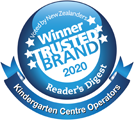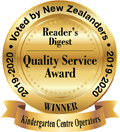LATEST STORIES
Choosing an Early Learning Centre for Your Child in New Zealand
Every parent wants the best for their child – a place where they can learn, be loved, and, above all - be happy!
Enrolling your child in a high-quality centre can significantly contribute to their language and social skills, as well as their physical, mental, and emotional development.
Children naturally learn through play, as their brains are wired for this way of learning. The skills that are learned at early learning centres provide them with a strong foundation for school and a lifelong journey of learning.
Choosing the perfect early childhood education centre for your child can feel like a daunting task. Here are a few things to keep in mind when looking for an Early Learning Centre in New Zealand.
Seek Recommendations
A great place to begin your search is recommendations from parents in your community. This can be friends, relatives or people within your community you trust. If there’s a particular centre you’re interested in, you can request a copy of their latest ERO report. ERO reports are conducted by the Education Review Office (ERO) who review and report on the quality of education and care of students in New Zealand.
Instincts
As a parent, you know when something feels right for your child and family. When visiting centres observe your gut feelings while you’re there. Think about how the centre and staff make you feel – do you feel comfortable, safe and welcome?
Observations
Stand back and observe the atmosphere, environment and interactions happening in the centre. Take notice of how your child is interacting in the centre, and how teachers are interacting with your child. It’s important to note that children can initially be shy and reserved when in new environments and around new faces.
Observe whether children have the freedom to play and explore. Ensure that the centre is clean and equipped with age-appropriate activities and materials to foster your child's development.
Connection
Children thrive on connection with their teachers, which nurtures their brain development and establishes a sense of security in the world. Look at how teachers connect with your child 1-1, and how they engage a group of children together. The friendships children make during their time in early learning help them develop core social and emotional skills for their development.
Important Considerations
Settling Visits
Enquire about the best way to help your child settle into the centre - some children may need you during their initial visits, while some may feel comfortable alone. If there are concerns about the transition, talk them through with the teachers for advice and guidance.
Language capabilities and culture recognition
It may be important that your child has someone who speaks their first language in their centre. Find out what centres have teachers speaking your home language and celebrating your important cultural events, to ease your child’s transition to their new environment.
Tip: Scan the QR code for languages spoken by teachers at your local BestStart centres.
Teacher-Child Ratios
Teacher-child ratios are an essential indicator of quality. For children under two, the minimum ratio is one teacher for every five children, and for older children, it's one teacher for every ten children. Ask about the centre's specific teacher-child ratios.
Centre Policies
Familiarise yourself with the centre's policies, especially concerning food, nutrition, health and safety, positive guidance, and illness protocols.
Qualifications
Qualified teachers in New Zealand typically hold a three-year degree. There are a range of qualified and unqualified teachers who may be in the centre and part of your child’s learning experience. Ask about the qualifications of the centre's staff to gain a better understanding of the teachers around you and your child.
Diversity
New Zealand is a melting pot of culture and diversity, and your child will learn about and embrace all the cultures within our country. Look for centres that actively celebrate diversity in their daily activities. This enriching environment provides valuable learning opportunities for your child and teaches them core social development skills.
Parent-Teacher Communication
It’s important to talk to the centre teachers and gain an understanding of how they will communicate with you about your child’s daily experiences and learning development. Ask about ways you and your family can be involved with your child’s experience at the centre, and how you can bring the learning back home to practice with your child.
Help to cover the costs of early childhood education (ECE)
In New Zealand, all 3 to 5 year olds are eligible for 20 hours free ECE help, even if non-resident. BestStart centres can help you with the application process for this assistance.
BestStart is for families who want more from early-childhood education.
As New Zealand’s largest Early Childhood Education provider, BestStart has been looking after New Zealand’s youngest for over 25 years.
Here’s some facts about us:
- We’re licensed to educate and care for over 19,000 children.
- 15,000 families use BestStart services annually.
- We have over 260 centres nationwide
- Te Whāriki, the world-wide acclaimed national early childhood education curriculum, is used in all centres.
- We have over 4500 employees nationally. Over 90% of our permanent teaching staff are either fully qualified with a diploma or Bachelor of Teaching (ECE) or higher, or are in training.



